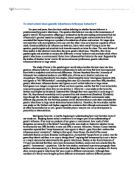After Marques Gaines separated his ways with his friends from a night of partying, he decided to buy a bag of chips at a close by 7-Eleven store, which is also known for 24-hour security. As he exits, he sees the assailant arguing with the store's security staff, Gaines tried to avoid the argument by walking past them, but suddenly he got attacked, getting hit in the head twice before the attacker ran away. As soon as he falls unconscious, the pedestrians calmly walked past as if nothing happened, two robbers run towards him and steal his phone and credit card, according to his family. The security guard asked crucial yet straightforward questions such as, is the person breathing? However, the guard did not take a few steps to approach the victim to check if his chest is rising. He replied that he is bleeding with eyes closed. To this point, it shows an extreme negative to the point that it is evil, in this case even worse than a bystander, the security guard represents the law of safety yet has failed.
It is common that in most situations, bystanders would assume that someone else will take the responsibility since they believe someone more qualified will assist. People cannot handle the stress and will not interfere with the legal cases. They adapt to others because they do not want to feel embarrassed or pressured (Audience inhibition). We would instead feel guilty and still think that we are good people. Few people would think that it is none of their business, that they have a busy life and therefore do not want to create problems for themselves and waste time. Since it was in the early hours during a weekend surrounded by bars, people that did not witness the fight assumed that the person is intoxicated and moved on.
People tend not to act out or speak up in crowds because they are unsure of what to think about the current situation. Most of the time, people do not want to involve themselves because they fear that their safety may be at stake. Pluralistic ignorance is as well an important factor that correlates to this case, the more amount of bystanders reject the situation, others will then assume that it is okay to accept it as a norm. As an example, the lower number of people, more help would be encouraged. This description connects to the term social loafing, which means that less effort made due to the group size. It makes them more independent in their actions. Everyone is going to be in situations where he or she have worries about the consequences, however when witnessing victims in danger; it is hard to grasp why people do not do anything to help or prevent the person from his or her life being in danger.
Too many people assume that other people will do something about it, and move on from the situation. What if we turned places with the person in need of help? How would it feel if they walked away? Helping others should be a part of humanity, it develops a feeling of inspiring others to do the same action and being brave to do good things. There should not be many exceptions as to why people should not want to help others unless their life is indeed threatened in that situation as well. We do shape the society that we live in, can we live with ourselves when we ignore each other's pain?
Lack of action by witnesses increases depending on the public settings, such as social and cultural cues, as well as human nature combined. The chances that someone will help in these traumatic situations are related to the number of people surrounding an incident; this is called the diffusion of responsibility according to social psychologists. People feel less personally responsible for helping when they are in the company of others; we look to the actions of others for guidance (social influence).
The proximity of the victim and the bystanders also supports the role of the bystander effect. Due to that, the victim was lying down unconscious, if there were a shorter distance between them or if the victim made eye contact that bystander would get the message that he is in need of their help. This sign of body language will make the person directly more responsible and thus more likely to help. If the victim was a particular gender or appearance, it could change the bystander's mind. If it were a woman, there would be more help. Unfortunately, people tend to judge the victim based on their looks.
Most bystanders are all experiencing feelings of confusion and hesitance, but still, bystanders have an obligation and responsibility to intervene when someone is in trouble. Taking moral responsibility is essential. Although, if a person is with a group of witnesses following an emergency situation, they should attempt to communicate with each other and figure out how each can best contribute to the situation. Discussing personal skills or resources that may prevent the case to get worse. To at least prevent the cars from accidentally running over the person, it takes a few minutes to stop cars and then call the police. It takes one person to step up and be a leader, taking that action will change the world of those in need.
Word Count: 1221 words








